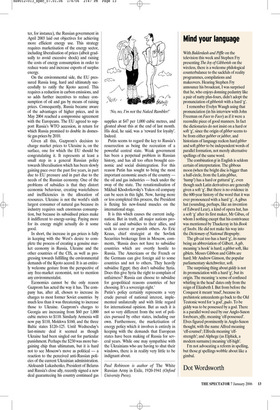Mind your language
With Balderdash and Piffle on the television this week and Stephen Fry presenting The Joy of Gibberish on the wireless, there is a welcome philological counterbalance to the sackfuls of reality programmes, compilations and makeovers. Hearing Stephen Fry announce his broadcast, I was surprised that he, who enjoys donning pedantry like a pair of natty plus-fours, didn’t adopt the pronunciation of gibberish with a hard ‘g’.
I remember Evelyn Waugh using that pronunciation (in his interview with John Freeman on Face to Face) as if it were a recondite piece of good manners. In fact the dictionaries do not insist on a hard or soft ‘g’, since the origin of gibber seems to be from either gabber or jabber, and historians of language reckon hard gibber and soft gibber to be independent words of parallel formation, not merely alternative spellings of the same word.
The combination gi in English is seldom certain of interpretation. The gibbous moon (when the bright disc is bigger than a half-circle, from the Latin gibbus, ‘hump’) has a hard or guttural ‘g’, even though such Latin derivatives are generally given a soft ‘g’. But there is no evidence in the 600-year history of the word that it was ever pronounced with a hard ‘g’. A gibus hat (sounding, perhaps, like an invention of Edward Lear), a kind of opera hat, has a soft ‘g’ after its first maker, Mr Gibus, of whom I nothing except that his contrivance was mentioned by Thackeray in his Book of Snobs. He did not make his way into the Dictionary of National Biography.
The gib cat too has a hard ‘g’, its name being an abbreviation of Gilbert. A gib, meaning ‘a hook’ is hard; a gibbet soft, like giblets. Messrs Gibbon and Gibbs are hard; Mr Andrew Gimson, the popular parliamentary sketchwriter, soft.
The surprising thing about giddy is not its pronunciation with a hard ‘g’, but its origin. The meaning ‘a sense of confused whirling in the head’ dates only from the reign of Elizabeth I. But from before the Conquest it meant ‘mad’, because its prehistoric antecedents go back to the Old Teutonic word for ‘a god’, gudo. To be giddy was to be possessed by a god. There is a parallel word used by our Anglo-Saxon forebears, ylfiy, meaning ‘elf-possessed’. Elves figured prominently in Anglo-Saxon thought, with the name Alfred meaning ‘elf-counsel’; Elfreda meaning ‘elfstrength’; and Alphege (as Elphick, a modern surname) meaning ‘elf-high’.
I’m not advocating a reform in spelling, but those gi spellings wobble about like a gimbal.
Dot Wordsworth





































 Previous page
Previous page